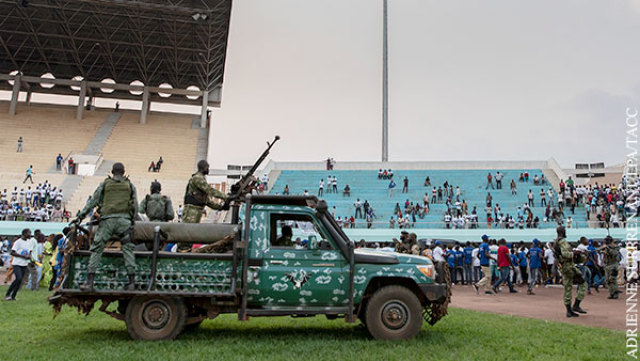The Defense Ministry told about the delivery of Russian armored vehicles to the CAR
The CAR received a batch of armored reconnaissance and patrol vehicles from Russia, the Russian Defense Ministry said. Shortly before that, it became known that an additional 300 military instructors were sent there. This is happening against the backdrop of an escalating internal conflict in the African Republic.
Russia sent a batch of BRDM-2 armored reconnaissance and patrol vehicles to the Central African Republic (CAR) in November, Deputy Defense Minister Alexander Fomin told Rossiyskaya Gazeta.
The Deputy Minister of Defense drew attention to the fact that interest in weapons of the Russian Federation is shown all over the world. Moscow plans to expand military and military-technical cooperation in Africa and the Middle East "in the current conditions of competition between the main world leaders for the military and economic markets" of these countries, Fomin stressed.
A few days earlier, the Russian Foreign Ministry said that the Russian side had sent an additional 300 military instructors to the CAR. They arrived in the republic at the request of its leadership, the Foreign Ministry explained. On the spot, Russian instructors will train servicemen of the National army of the republic.
Diplomats explained this need by the fact that paramilitary groups, coordinated and supported from outside, began to move through the country. The Foreign Ministry stressed that they destabilize the situation in the CAR and threaten to disrupt the electoral process in the upcoming presidential elections. "In fact, the rebel forces carried out the seizure of cities and settlements, accompanied by clashes with the army units of the Armed Forces of the CAR, and the dispersal of the executive authorities on the ground," the ministry said.
The conflict in the republic broke out in early December 2013, when clashes broke out in Bangui between militants of the former Islamist group "Seleka" and Christian rebels opposing them. According to the UN at the end of July 2018, about 6 thousand people were killed during the conflict, up to 1 million people were forced to leave their homes.
In February last year, after almost two weeks of negotiations in Khartoum, the CAR authorities and representatives of armed groups signed a peace agreement. The Government has committed itself to ensuring the freedom to form parties or political movements. It was also decided to create the conditions necessary for the voluntary return of refugees.
Russia and the CAR signed an agreement on military cooperation on August 21, 2018. The document was signed at the Army-2018 forum in Kubinka, near Moscow. The agreement became the basis for the training of the Central African military specialists from the Russian Federation, explained in the military department of the CAR.
A few months earlier, on March 22, 2018, the Foreign Ministry reported that Russia had sent a group of instructors to train soldiers of the CAR army. As noted by the then deputy head of the Information and Press Department of the Russian Foreign Ministry Artem Kozhin, at the request of the President of the republic Faustin Touadera and with the knowledge of the committee established by the UN Security Council, five military and 170 civilian instructors from Russia were sent to Central Africa.
The second condition for the withdrawal of the Russian military from the CAR suggests that the presence of Russian representatives in the republic will become impractical due to changes in the international military-political situation.
The Russian Defense Ministry in January-February 2018, in addition, donated a batch of small arms and ammunition to the CAR army.
Already after the conclusion of the agreement on military cooperation, in 2019, Russia, with the knowledge of the UN Security Council, donated two batches of its weapons to the CAR. Russian Foreign Minister Sergei Lavrov at the end of September 2019 at a meeting of the UN Security Council noted that Moscow handed over Kalashnikov assault rifles and machine guns, Mosin rifles of the 1944 model and other small arms.
Kristina Sizova

